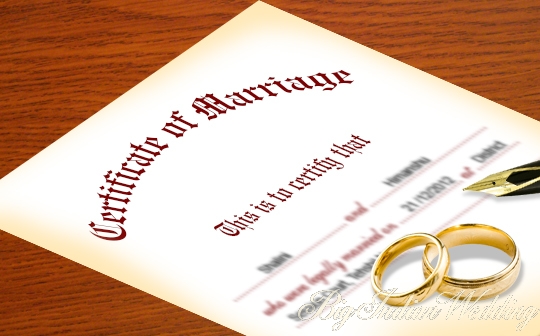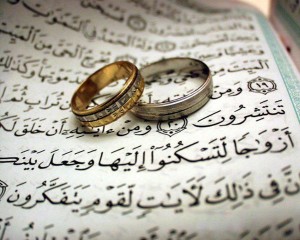In this blog post, Pranav Rudresh, a student of Lloyd Law College, Greater Noida, writes about the legal procedure for getting married in India, salient features of the marriage registration processes and the costs behind them.
Sociologically, marriage can be defined as the approval of union between two people which must be a steady and lasting relationship. Marriage creates an environment for cultivation and fulfilment of love. In legal terms, marriage is defined as a contract by which a man and a woman reciprocally engage with each other so as to live together. Legally, it is important for both the parties to subscribe to the contract by will if they want to call it as marriage.
It is important to know what are the legal procedures involved in a valid marriage. This article gives a brief idea about the same. Firstly, let’s figure out which acts are related to marriage in India. In India, there are different marriage acts for different religions. For Hindus, there is the Hindu Marriage Act, 1955, which is also applicable for Jains, Sikhs, and the Buddhists. Muslims also have their personal law, which states that Nikah or marriage is a contract and may be permanent or temporary and permits a man to have four wives, the condition being that he must treat all of them equally. For the Parsees, there is a Parsee Marriage & Divorce Act, 1939, which governs the provisions of their marriage and law. For an Indian Christian, there is the Indian Christian Marriage Act 1889.
Thus the Acts related to marriage in India are
- The Hindu Marriage Act, 1955.
- The personal laws of marriage and divorce.
To know more about the legal procedure for registration of marriage in India in brief, please refer to the video below:
Procedures of marriage and registration under the Hindu Marriage Act, 1955
As stated above, the Hindu Marriage Act, 1955 applies to many religions such as the Hindus, Jains, Sikhs and the Buddhists. It is also applicable to the persons if they have converted to any of these religions from any other religion. The primary condition according to this act is the age of the bride and the bridegroom. While in the case of bride it has been stated as 18 years, in the case of the bridegroom, it is 21. This means that no male or female belonging to any of the above-mentioned religions shall be legally allowed to marry before attaining the aforementioned ages. The Hindu marriage act applies to all over Indian states and the Union territories, Jammu and Kashmir being an exception to it.
According to the law and as per the recent strict guidelines of the Supreme Court, it is highly necessary to register the marriages. Let’s now take a look at few the registration processes and the cost of the same.
As per the Hindu Marriage Act, 1955, following are the requirements for registration:
- One can apply for marriage at any sub-divisional magistrate’s office; the offline application method can be initiated from there itself; the registration can be done online as well. The details are required after confirming your district/state. In the case of Hindu Marriage Act, one has to wait only 15 days for an appointment while it may extend to 30 days in case of Special Marriage Act.
- The registration form must be duly signed by both male and female with a sound state of mind. Both the parties must not fall within any degree of prohibited relationship.
- The second requirement for registration under Hindu Marriage Act, 1955 is any document that provides the date of birth of the individuals. The documents maybe the birth certificate, matriculation certificate, passports, PAN cards, etc.
- Two passport size photographs of both the parties are required, also one marriage photograph and Marriage invitation card (which although is not mandatory).
- In a case where the individuals have converted to any of the religions which the Hindu Marriage Act, 1955 covers, the conversion certificate duly verified by a priest to the religion which the individuals have converted to, is also required.
- The most important process for the registration to complete is the attestation of a Gazetted officer. All the above-mentioned documents must be verified by a Gazetted officer.
- After the submission of all the above-mentioned documents duly verified, it shall be the duty of the district court to confirm and put a final thumbs up on the marriage registration of the individuals.
Cost of registration:
The basic cost of registration differs from state to state; it is however in between Rs. 100-200.
Procedures of marriage and registration under the Special Marriage Act, 1954
The Indian Special Marriage Act is for those who don’t opt the religious way of marriage, i.e. those who prefer other methods of getting married apart from the religious methods such as court marriage.
Marriage between an Indian and a foreigner:
The Special Marriage Act also gives guidelines for marriage between the Indians and Non Indians (foreigners), the condition for which the marriage is taking place in India and not anywhere else. It is also highly necessary for one of the two partners to be at least temporarily residing in India. If one of the partners is residing outside India, it is important for the partner residing in India to fill the Marriage notice which can be obtained from any marriage registrar the individual wishes. This notice will then be sent to the foreign partner who will have to fill it accordingly and submit back to the registrar. The couple then needs to wait for a month to be married.
This process can also be legally useful in applying for Visa or some sort of property issues.
Now the question is whether like the Hindu Marriage Act, 1955, documents are required for registration under the Special Marriage Act, 1954 too? The answer to this is yes, just as the Hindu Marriage Act, documents for registration are required under the Special Marriage Act too. Following are the list of documents required for registration under the special marriage act:
- Passport – A valid passport is a must requirement in the case of registration under the special marriage act.
- Birth certificate.
- A copy of the divorce certificate in case of divorcees.
- Death certificate of the deceased spouse in case of widowed partner.
- The certificate mentioning the stay of a couple in India for the period of 30 days.
The special marriage act also covers the requirements of court marriages in India. Court marriage can be between an Indian male and a female irrespective of their caste, religion or creed. It can also be between an Indian and a foreigner, rules of which have been already explained just above. What court marriage does is it removes the rituals and ceremonies that happen the traditional/religious marriages. The interested parties can directly apply to the Marriage Registrar for registration of marriage and be granted of the marriage certificate by the registrar.
There are different situations in court marriage. To mention a few, court marriages can be done among these:
- Both male and female are Hindus.
- Both male and female belong to different religions.
- Between an Indian and foreigner.
According to the Special Marriage Act, when two individuals are willing to do a court marriage, they need to ensure the following things:
- Both the individuals must not be married substantially to any other partner, i.e. both the parties are required to be unmarried.
- Both the individuals must have attained the legal age of marriage, i.e. 21 in the case of the groom (male) and 18 in the case of the bride (female).
- Both the individuals should be marrying with the sound state of mind, and none shall be under any sought of unsound state of mind.
Conditions and requirements for registration when both male and female are Hindus:
Now let’s take a look at the procedure followed in case of both individuals being Hindu:
- The individuals are required to fill the form and submit it to the marriage registrar in one of the districts in which either of the individuals has resided for not less than a month.
- The marriage may be allowed only after 30 days unless there is any sort of objection from any of the individual.
- The marriage is required to take place only at the specified marriage office.
- Both the individuals are required to be present physically at the time of marriage.
- The presence of 3 eye witnesses.
Now we look at the most important thing. The documents required for registration. The documents required are as follows:
- Passport sized photos of the individuals along with the given form and prescribed fee.
- Resident proof of the individuals.
- Birth certificate of the individuals.
- Photos and residential proof of eye witnesses.
Conditions and requirements for registration when both individuals are of different religion:
Under Special Marriage Act, the procedure, as well as the documents necessary for marriage where both individuals are of different religions is almost the same as that in the case where both the individuals are Hindus. Both individuals must file their application in the marriage registrar’s office in the same process as mentioned above. The documents requirement are also the same as mentioned above unless any special circumstances.
Charges an individual has to pay to get married under the Special Marriage Act:
There is no charge taken by the registrar. Registration form charges differ from state to state. The individuals are required to submit the form charges along with the required documents at the time of registration. Generally it is between Rs. 150-200.
A brief account of the personal marriage and divorce Acts
India, being a multi-religion nation, required a law apart from the Hindu marriage act and the special marriage act. Thus each citizen of India is entitled to have his personal laws in case of marriage and divorce.
It has been earlier stated as well that in a case of the Hindus, Sikhs, Jains, and Buddhists, they are governed by the Hindu Marriage Act, 1955, which provides an essential condition as to which the bridegroom should be the age of 21 years and bride of 18 years. Divorce under the Hindu Marriage Act 1955 can be obtained on the various grounds.
Muslims also have their personal law, which states that Nikah or marriage is a contract and may be permanent or temporary and permits a man, four wives if he treats all of them equally.
Similarly, for the Parsees, there is a Parsee Marriage & Divorce Act, 1939, which governs the provisions of their marriage and law. The Indian Christians are to follow the Indian Christian Marriage Act 1889.
Recently the Supreme Court of India, in the case of Smt. Seema v. Ashwani Kumar on 14 February 2006 issued an order to all the states that marriages must be registered and that it should take no longer than three months. The petition was filed by Seema, a divorced woman, seeking compulsory marriage registrations. The woman’s former husband had refused to pay her alimony claiming that they were never married. The petitioner’s counsel, Balraj Diwan, said the man was taking advantage of the fact that the marriage was never registered. In February 2006; the court held that compulsory registration of marriages of all religions would be a step in the right direction for the prevention of child marriage – a practice that is still widespread in many parts of the country. It said that one way to check the practice was to make it legally binding on all couples to register their marriages, mentioning their ages at the time of marriage.
Thus for any marriage to be termed legal, the registration in the respective registrar’s office must be done within three months. This would not only help government for easy gathering of married people’s census but also help the government to seek out ways to fight against marriage related crimes.
 Serato DJ Crack 2025Serato DJ PRO Crack
Serato DJ Crack 2025Serato DJ PRO Crack












 Allow notifications
Allow notifications



[…] after the guidelines of the Supreme Court[15], it is mandatory to get the marriage registered as per proper procedures. The marriage can be registered under any of these […]